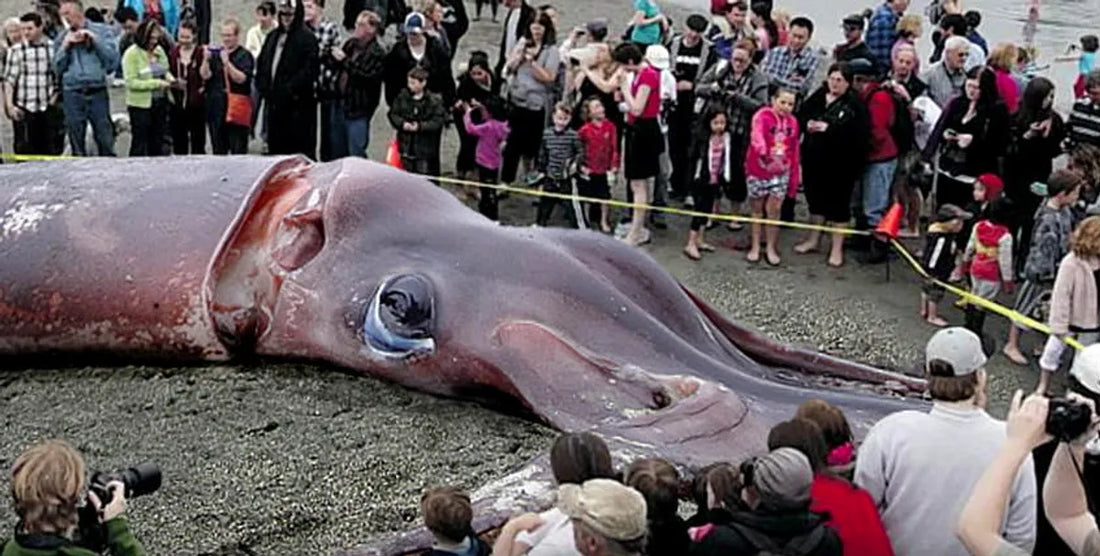
The Deep Sea’s Hidden Champions: Apex Predators Beyond Sharks
🌊 Forget Sharks (not really we love sharks), Meet the Real Deep Sea Bosses
Picture it: black water so deep the sun has never touched it. You hover in the stillness, surrounded by twinkling pinpricks of bioluminescence. Then—FLASH—something moves faster than thought. A tentacle unfurls. A jaw unhinges. And in that blink, a life is claimed.
When most people think “apex predator,” their minds go straight to sharks. But here’s the truth—sharks are just the tip of the trident. The ocean is full of rulers, each adapted to its own kingdom: some invisible in the abyss, others lurking just offshore. Without them, the balance of life below the waves collapses.
____________________________________________
🦑 The Kraken’s Kin: Giant Squid
Long before science confirmed their existence, sailors swapped nightmare stories about the kraken—monsters capable of dragging ships under with suckered limbs the size of tree trunks. Today, we know the legends were exaggerated… but only slightly.
The giant squid (Architeuthis dux) can reach lengths of 40+ feet, their dinner plate-sized eyes adapted to detect the faintest glimmer of prey in total darkness. Unlike sharks, giant squid hunt in the twilight and midnight zones, where every meal is a high-stakes ambush. They snatch deep-diving fish with lightning-fast tentacle strikes, then pull them toward a parrot-like beak capable of slicing through flesh and bone.
Why should we care? Because giant squid are not just mythical—they’re ecosystem engineers. They control the population of fast-breeding species like lanternfish, keeping the deep-sea food web from spiraling out of control. Without them, prey numbers could explode, starving out other predators and even affecting surface fisheries.
____________________________________________

In the deep blue hush where sunlight fades, a giant squid drifts upward—alien grace in liquid shadow. Every slow, deliberate movement feels like a glimpse into another world, one that’s been watching us far longer than we’ve been watching it.
____________________________________________
🐉 Dragon of the Twilight Zone: Deep-Sea Dragonfish
If there were an award for “Most Metal Predator You’ve Never Heard Of,” the deep-sea dragonfish would win, hands down. Imagine a body barely longer than your forearm, armed with teeth so long they can’t fit inside a closed mouth.
These twilight-zone assassins (Stomiidae family) are ambush hunters with a unique superpower: they can produce their own red light. In the deep ocean, red light is invisible to most animals—but dragonfish can see it. This allows them to scan for prey without revealing themselves, a stealth mode most predators can only dream of.
Dragonfish keep lanternfish, shrimp, and squid populations balanced. They may be small, but in the deep sea, they’re a controlling force—proof that size isn’t everything when you’re running the food chain.
____________________________________________

Armed with teeth like glass daggers and a lure that glows in the dark, the deep-sea dragonfish turns the midnight zone into its personal hunting ground.
____________________________________________
⚡ Silver Bullets: Barracuda & Other Coastal Predators
Closer to shore, another class of apex predator keeps reefs and nearshore waters in check: the barracuda. With torpedo bodies and a mouthful of razors, they’re pure acceleration and precision.
Barracuda (Sphyraena barracuda) prey on everything from snapper to mullet, regulating fish populations and preventing weaker species from dominating coral reef ecosystems. The same goes for other agile coastal hunters like trevally and groupers—these are the enforcers of reef law. Remove them, and suddenly smaller fish breed unchecked, algae grazers decline, and coral reefs start suffocating under algae blooms.
____________________________________________

This image above captures a great barracuda suspended in the stillness of the open water, its streamlined, metallic body reflecting the muted blues of the ocean around it. Every feature speaks of a predator built for precision—the elongated shape, the subtle vertical barring along its flanks, and that fixed, watchful gaze. Its slightly open jaws reveal a formidable set of razor-sharp teeth, hinting at the lightning-fast strike it’s capable of unleashing.
____________________________________________
🌌 The Food Web’s Glue
Every predator you’ve met so far—giant squid, dragonfish, barracuda—serves one job: keep the system from breaking. Without apex predators, the phenomenon known as a trophic cascade begins.
Here’s how it works: remove an apex predator, and their prey’s population surges. That prey eats more of its own food source, depleting it. Other species that relied on that same food disappear. Slowly, the entire food web crumbles from the top down.
It’s not just theoretical. We’ve seen it happen with the loss of sea otters in kelp forests and tuna in the open ocean. The ocean’s architecture depends on predators keeping everything balanced, from plankton to whales.
____________________________________________
🚨 Why They’re in Trouble
These predators may be the ocean’s elite, but they’re far from invincible.
- Overfishing & Bycatch – Apex predators often end up in fishing nets meant for other species. Deep-sea trawls and longlines don’t discriminate.
- Plastic & Chemical Pollution – Predators accumulate toxins at higher levels through biomagnification. A single fish filled with microplastics becomes a toxic snack for its hunter.
- Climate Change – Warmer waters push prey into new territories, forcing predators to follow—sometimes into waters where they can’t survive.
____________________________________________
🤝 How to Be Their Ally
You don’t have to be Jacques Cousteau to help these ocean titans.
- Choose Sustainable Seafood – Follow guides like Seafood Watch to avoid buying fish caught in ways that harm predators.
- Reef-Safe Tourism – Support dive operators who respect marine life and avoid feeding predators for photo ops.
- Support Apex Predator Conservation – Groups like the Oceanic Preservation Society fund protection and research for under-the-radar species.
- Wear Your Awareness – Every Immoral Coral shirt is more than apparel—it’s a banner for the ocean’s survival. When people ask about your shirt, you get to tell them about these unsung apex predators.
____________________________________________
💬 Closing Rally Cry
The next time someone tells you sharks are the only kings of the ocean, tell them about the dragonfish that hunts in invisible light, or the squid whose eye can spot prey in the ink-black abyss. Tell them balance doesn’t come from one crown, but from a council of predators ruling every depth.
At Immoral Coral, we don’t just defend reefs—we defend the entire ocean hierarchy. Because the moment we lose its champions, we all start to sink.
____________________________________________
